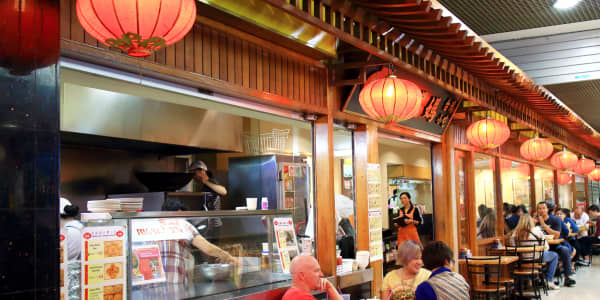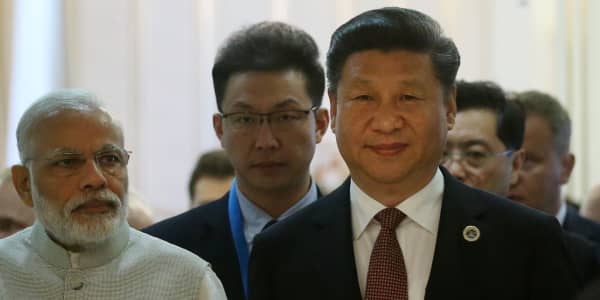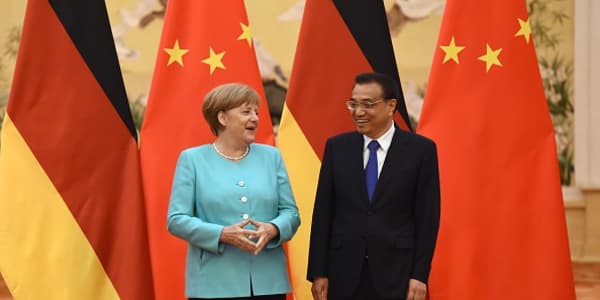Manchester United today completed the transfer of French player Paul Pogba from Juventus for a record-breaking transfer fee of £89 million ($115.5 million). But in recent months, European soccer clubs have had to tackle a new player in the international transfer market: China.
Investment on new soccer stars from teams in China's domestic Super League (CSL) is on the rise, with top foreign players being offered eye-watering sums to uproot and join clubs in the Middle Kingdom. In this industry at least, China seems to be paying considerable attention to importing, rather than exporting.
According to Deloitte's Annual Review of Football Finance, published in June 2016, China's "commitment to football has triggered investment of c.£200 million in playing talent by Chinese Super League Clubs in the 2016 winter transfer window." This is more than any other country. During transfer season earlier this year, CSL signings broke Asian records three times in 10 days.
Top players moving eastwards
The CSL had been seen as a well-paid retirement home for older stars. However that has all changed.
"Recently, China has been attracting a different caliber of players who are significantly younger than before. Chinese clubs have also been signing players with many international caps, like (Brazilian soccer star) Ramires," says Kevin Alavy, managing director of Futures Sport + Entertainment told CNBC over the phone.
Shanghai SIPG signed Brazilian soccer player Givanildo Vieira de Sousa – more commonly known as Hulk – at the end of June for $61 million. Previously playing for Zenit St Petersburg, Hulk's move makes him the most expensive signing in Asian soccer. Other hot recent acquisitions include Alex Teixeira by Jiangsu Suning for $55 million; Jackson Martinez by Guangzhou Evergrande for $47 million; and Ramieres by Jiangsu Suning again for $29.7 million, according to figures compiled by the Financial Times.
Sky-rocketing salaries are a key attraction. The Independent reported in July that four of the world's top 10 highest paid soccer players are from Chinese clubs. Hulk is set to earn £16.5 million per year, making him the world's third highest played soccer player, trailing only to Cristiano Ronaldo and Lionel Messi. Other names on the list include Graziano Pelle at Shandong Luneng earning £12.5 million; Ezequiel Lavezzi at Hebai China Fortune earning £10.5m; and Jackson Martinez at Guangzhou earning £10m.
Notably, only five overseas players are allowed per team in the CSL, permitting the vast sums of money offered to attract big name players.
Alavy says, "top players signed are often attackers. They tend to be higher profile, as the positions are more glamorous. A top striker can make a difference quickly."
With regards to domestic interest, Alavy suggests that, "Chinese fans prefer domestic talent. But more important is a team's success. Overseas talent makes teams stronger, so it's a price worth paying to see success." He also explains that higher quality players spur on motivated teammates to learn from them technically.
Knock-on effect for dominant European leagues
China's buying of top global talent could negatively impact soccer's influential Europe-based leagues.
At a press conference in February of this year, Arsene Wenger, manager of Arsenal, said that the Premier League should be worried "because China looks to have the financial power to move a whole league of Europe to China."
But while Chinese clubs forking out high prices could establish a bubble, the prestige of clubs based elsewhere also has an impact.
Alavy doesn't see the status quo of dominant European soccer changing soon, saying that "money is not the only thing that matters. You can't create history. There are also more attractive trophies in La Liga and the Premier league, for example."
He also cites personal reasons being important to players, such as the lifestyle in different countries and the ability to speak the local language.
Nonetheless, the purchasing power of European clubs remains impressive Earlier today, Royal Bank of Scotland tweeted about Manchester United's latest signing, saying:
Seeing things differently, Edward Woodward, executive vice-chairman of Manchester United, said in February that China's growing presence in soccer had created "another useful market if we're looking to sell any players."
Support for Chinese soccer comes from the top, as President Xi is a fan, and likely understands the global industry to be crucial for carving out China's image on the world stage. China has designs on hosting – and winning – a future FIFA World Cup. Whilst the latter intention looks to be an uphill struggle – China has only qualified for one World Cup, in 2002, and lost all its games at the group stage – the former is not unrealistic.
Alavy says, "the earliest China could host a FIFA World Cup is 2026 and there are strong arguments for doing so. They hosted the Beijing Olympics in 2008, for example."




